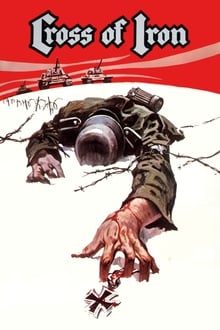
The aristocratic "Capt. Stransky" (Maximilian Schell) is put in charge of an accomplished squadron of men that works well under its no-nonsense "Sgt. Steiner" (James Coburn), and into battle against the approaching Soviets they go. A bloody encounter ensues and upon their return, victorious to a point, to their trenches he encourages "Col. Brandt" (James Mason) to nominate him for an Iron Cross. He cites two officers as the witnesses to his bravery, but "Steiner" decides not to play ball. "Stransky" is livid, but plays a long game that ends up seeing the squad left unaware of marching orders and left adrift in the face of an enemy with overwhelming superiority. "Steiner" must now galvanise his already exhausted and demoralised soldiers and try to work their way through increasingly hostile territory to make it back to their own lines. Sam Peckinpah uses the Soviets as his foe here so that avoids any unpatriotic accusations back home, and allows him to deliver a gritty and authentic looking wartime drama that focusses way more on the human beings involved. Their flaws and their strengths are illustrated as each is tested to his own individual breaking point - all whilst shells and bullets fall around them. Coburn was a master of the less-is-more style - his demeanour and facial expressions did most of his acting for him, and there's also a strong contribution from David Warner as the battle-weary "Kiesel". James Mason, I felt, wasn't quite a natural here but in the end it all comes down to a battle of wills between the entitled "Stransky" and the experienced "Steiner" who lock horns effectively. The production and photography really capture well the degradation in which these soldiers - and the locals they encounter along the way - lived their lives. In muddy squalor with little food and and some almost animalistic instincts at times, too. It's also an entirely plausible nail in the coffin of the last vestiges (as was the case in the Great War) of command being vested in the upper classes who cared little for anything but the plaudits of laurel leaves and faux bravery.